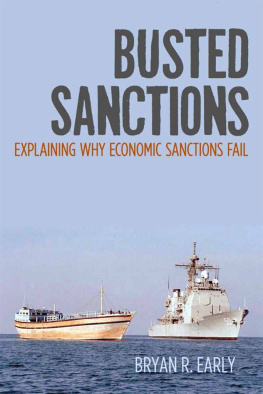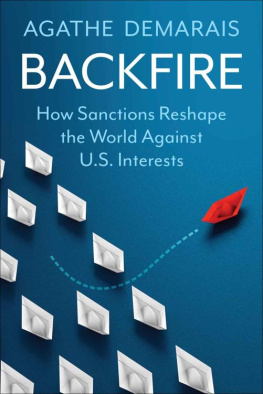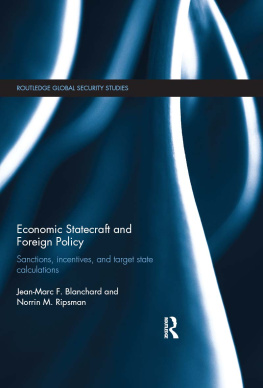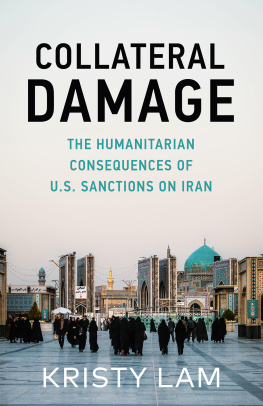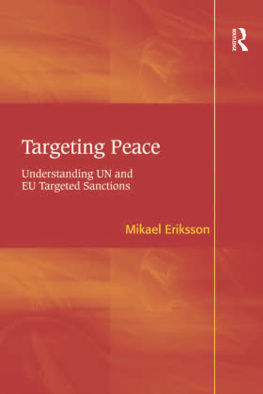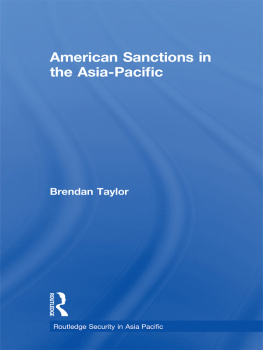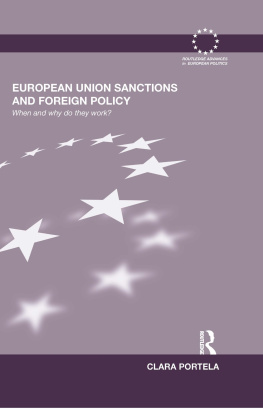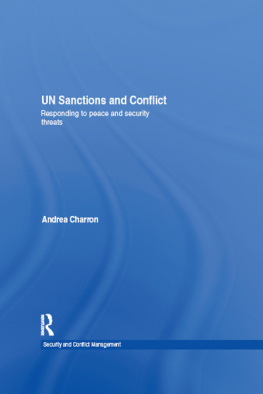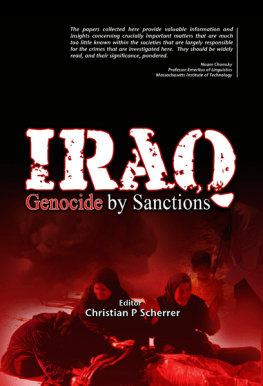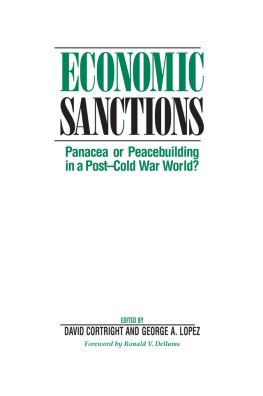Stanford University Press
Stanford, California
2015 by the Board of Trustees of the Leland Stanford Junior University.
All rights reserved.
No part of this book may be reproduced or transmitted in any form or by any means, electronic or mechanical, including photocopying and recording, or in any information storage or retrieval system without the prior written permission of Stanford University Press.
Printed in the United States of America on acid-free, archival-quality paper
Library of Congress Cataloging-in-Publication Data
Early, Bryan R., 1982 author.
Busted sanctions : explaining why economic sanctions fail / Bryan R. Early.
pages cm
Includes bibliographical references and index.
ISBN 978-0-8047-9273-8 (cloth : alk. paper)ISBN 978-0-8047-9413-8 (pbk. : alk. paper)
1. Economic sanctions, American. 2. Economic sanctions. 3. United StatesForeign economic relations. 4. United StatesForeign relations administration. I. Title.
HF1413.5.E25 2015
327.1'17dc23
2014036766
ISBN 978-0-8047-9432-9 (electronic)
Typeset by Thompson Type in 10/14 Minion
BUSTED SANCTIONS
Explaining Why Economic Sanctions Fail
Bryan R. Early
Stanford University Press
Stanford, California
To my parents, Pam and Walt Early
Contents
Acknowledgments
THIS BOOK WAS WRITTEN WITH THE SUPPORT OF MANY GENEROUS contributors who provided their encouragement, feedback, research assistance, and financial support over the years. I am first off indebted to my wonderful parents Pam and Walt Early for all the support they have provided me. I would also like to thank my wife Pamela Early for her depthless patience, love, and encouragement over the many years of work that went into this book.
I would especially like to thank all the institutions that made this book possible through their financial support. I would first like to thank the Center for International Trade and Security at The University of Georgia, which provided me with the initial support for this project. A portion of this project was also researched while I was a Research Fellow with the Belfer Center for Science and International Affairs at Harvard Universitys John F. Kennedy School of Government from 2008 through 2009. The Belfer Center provided a wonderful intellectual environment for developing a number of the core ideas of this project. I would also like to thank the Dubai School of Government, which hosted me as a Visiting Scholar in 2009, where I gained a lot of firsthand insights into the books subject matter. My authorship of this book was chiefly made possible by a generous grant from the Smith Richardson Foundation as part of its International Security & Foreign Policy Junior Faculty Research Grant Program. I am very grateful to the Smith Richardson Foundation for granting me the time and resources I needed for this project. I would not have been able to write this book without the Foundations support. Lastly, I would like to thank the Rockefeller College of Public Affairs and Policy at the University at Albany, SUNY, for funding my book workshop in the summer of 2013.
I am indebted to a number of individuals who provided me with their feedback on this project as well. At the University of Georgia, I would like to thank Jeffrey Berejikian, Douglas Stinnett, Jaroslav Tir, and Brock Tessman. Special thanks are also due to Gary Bertsch, who opened the door for me to learn about economic statecraft. I would also like to especially thank Matthew Fuhrmann, who has provided me with great advice and feedback throughout this book project. In addition, I would like to thank Navin Bapat, Amanda Carroll, Johannes Karreth, Kristine Kilanski, Rey Koslowski, Cale Horne, Quan Li, Michael Mood, and Patty Strach for the feedback they provided on various aspects of this project. I would also like to sincerely thank Victor Asal, A. Cooper Drury, Sally Friedman, Katja Kleinberg, David Lektzian, Julie Novkov, and David Rousseau for the incredibly useful feedback they provided at my book workshop. Last but not least, I would like to thank all of the current and former government officials and members of the sanctions policy community who provided background and feedback for me on my project. One of the reasons for greater optimism regarding the use of economic sanctions is that there are so many intelligent, motivated individuals in the policy world committed to making sanctions policies more effective.
Finally, I would like to acknowledge the wonderful support I have received from my research assistants in the Department of Political Science at the University at Albany. I would like to thank Nolan Fahrenkopf and Keon Weigold for their excellent editorial support and the supporting research they provided me with during this project. I would like to provide especial thanks, though, to Amira Jadoon for the exceptional assistance she provided in researching the case studies conducted as part of this project. Amira was also instrumental in supporting my efforts to incorporate an explanation of aid-based sanctions busting into my study. I am very grateful to have had her support on this project and all the positive contributions she has made to it.
Introduction
Why Busted Sanctions Lead to Broken Sanctions Policies
THE ISLAMIC REPUBLIC OF IRAN HAS BEEN SUBJECT TO U.S. economic sanctions since 1979, but only in recent years has the U.S. government been really successful in obtaining multilateral support for its efforts to economically isolate Iran. Most notably, in the spring of 2012, the European Union (EU) blocked Iran from employing the Belgium-based SWIFT (Society for Worldwide Interbank Financial Telecommunication) network used by most financial institutions for their international financial transactions. This move, made in concert with aggressive U.S. efforts to isolate Irans financial system, was designed to make it more difficult for Iran to repatriate the payments for its fossil fuel exports.place to immediately start facilitating the transactions. There was no better venue in the world to carry out such a scheme.
From July to August, Turkish gold exports to the UAE exploded from $7 million to $1.9 billion. The thirty-six tons of gold that Turkey shipped to the UAE in August comprised over 82 percent of Turkish total gold exports that month.
This case is fascinating for a number of reasons. First, it is illustrative of the cat-and-mouse game that has evolved between the United States and Iran with respect to the formers sanctions. Iranians have become world-class experts at devising ways of circumventing or undercutting the U.S. and international economic sanctions imposed against it.since 1994, and Turkey is a NATO ally of the United States and most of the EUs members. Their involvement in deliberately undermining their allies sanctioning efforts against Iran represents an intriguing puzzle in need of an explanation.
The UAE gained international attention for its illicit trade relationship with Iran when it was revealed that the infamous A. Q. Khan proliferation network used Dubai as a central hub for proliferating sensitive nuclear technologies to Iran in the early 2000s. In delving more deeply into the UAEs commercial relationship with Iran, it is clear that the Khan networks activities were not an isolated exception. The UAE had been a leading venue for conducting sanctions-busting trade with Iran since the U.S. government had first sanctioned it. In many ways, Dubais explosive growth as the Persian Gulfs leading trade hub was linked to its role as Irans primary entrept for circumventing the sanctions imposed against it. When the UAE formally forged a military alliance with the United States in 1994, the UAEs sanctions-busting activities only accelerated further. All the U.S. efforts at making its sanctions against Iran more stringent during the 1990s appeared only to increase the profits reaped by the Emiratis and added little to the pressure felt by the Iranian regime. During this period, American and Iranian firms flocked to Dubai to continue doing business with one another. All this background information became very real for me when I visited Dubai in 2005 and strolled by the scores of dhows docked alongside Dubais Persian Sea inlet that were stacked high with American products destined for Iran.

